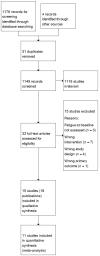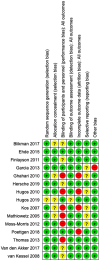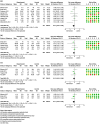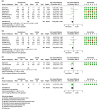Education for fatigue management in people with multiple sclerosis: Systematic review and meta-analysis
- PMID: 39225447
- PMCID: PMC11555147
- DOI: 10.1111/ene.16452
Education for fatigue management in people with multiple sclerosis: Systematic review and meta-analysis
Abstract
Background and purpose: Fatigue is a common and disabling symptom in multiple sclerosis (MS). Educational interventions have shown potential to reduce fatigue. The aim was to systematically review the current best evidence on patient education programmes for MS-related fatigue.
Methods: This was a systematic review and meta-analysis following Cochrane methodology. A systematic search was conducted in eight databases (September 2023). Moreover, reference lists and trial registers were searched and experts in the field were contacted. Randomized controlled trials were included evaluating patient education programmes for people with MS with the primary aim of reducing fatigue.
Results: In total, 1176 studies were identified and assessed by two independent reviewers; 15 studies (1473 participants) were included. All interventions provided information and education about different aspects of MS-related fatigue with different forms of application, some with components of psychological interventions. Amongst those, the most frequently applied were cognitive behavioural therapy (n = 5) and energy-conservation-based approaches (n = 4). Studies differed considerably concerning mode of intervention delivery, number of participants and length of follow-up. Interventions reduced fatigue severity (eight studies, n = 878, standardized mean difference -0.28; 95% confidence interval -0.53 to -0.03; low certainty) and fatigue impact (nine studies, n = 824, standardized mean difference -0.21; 95% confidence interval -0.42 to 0.00; moderate certainty) directly after the intervention. Mixed results were found for long-term effects on fatigue, for secondary endpoints (depressive symptoms, quality of life, coping) and for subgroup analyses.
Conclusion: Educational interventions for people with MS-related fatigue may be effective in reducing fatigue in the short term. More research is needed on long-term effects and the importance of specific intervention components, delivery and context.
Keywords: fatigue; meta‐analysis; multiple sclerosis; patient education; systematic review.
© 2024 The Author(s). European Journal of Neurology published by John Wiley & Sons Ltd on behalf of European Academy of Neurology.
Conflict of interest statement
The authors declare no conflicts of interest.
Figures






References
-
- Patti F, Vila C. Symptoms, prevalence and impact of multiple sclerosis in younger patients: a multinational survey. Neuroepidemiology. 2014;42(4):211‐218. - PubMed
-
- Penner IK, Paul F. Fatigue as a symptom or comorbidity of neurological diseases. Nat Rev Neurol. 2017;13(11):662‐675. - PubMed
-
- Mills RJ, Young CA. A medical definition of fatigue in multiple sclerosis. QJM. 2008;101(1):49‐60. - PubMed
Publication types
MeSH terms
LinkOut - more resources
Full Text Sources
Medical

